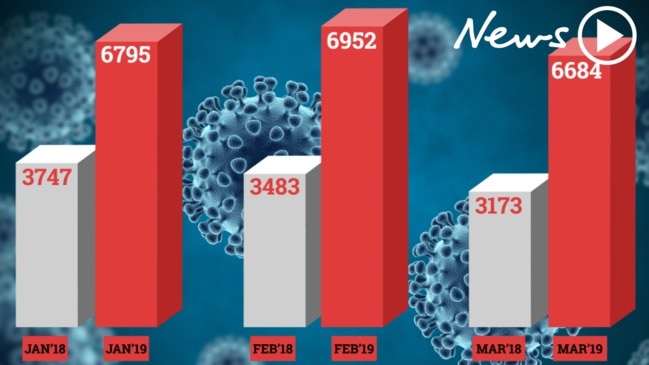Flu jab may not protect from mutant virus
The flu has mutated into a monster strain, making it potentially the worst ever flu season on record. Now, scientists fear the vaccine may be ineffective against the virus.

Illness
Don't miss out on the headlines from Illness. Followed categories will be added to My News.
EXCLUSIVE
The flu has mutated and it may no longer be a good match for the vaccine as Australia’s record breaking flu season gets even worse.
It comes as a breakthrough by Australian researchers means the annual flu jab could one day be replaced with a more effective vaccine that lasts for five or ten years or even a lifetime.
More than 120,000 Australians have been struck down by the flu so far this year with more than 220 killed by the virus.
Five times more people had caught the flu by July this year than during our worst ever outbreak in 2017, when 1255 people died from influenza in Australia.
Griffith University influenza expert Professor Paul van Buynder says one reason is that a key strain of the flu virus appears to have mutated.
World Health Organisation Influenza Centre spokeswoman Professor Kanta Subbarao whose laboratory tests samples of flu circulating in the community has confirmed testing shows the H3N2 strain of flu has mutated.
“We don’t know how much those molecular changes will affect how the vaccine protects,” she said.

It was a mutation in the H3N2 strain of flu that was behind the worst flu season on record in 2017 and the WHO lab says this appears to be the dominant strain of the flu circulating the community at the moment.
Australians should continue to get the flu vaccination because it protects against three other strains of the virus and could reduce the severity of any H3N2 infection, Professor Subbarao said.
WHY YOU NEED TWO FLU SHOTS A YEAR
But she warns Australians to take additional measures to reduce the spread of the flu by staying home if sick, washing hands and using anti-viral drugs if vulnerable people are infected.
The flu virus continually mutates as a result of errors that occur in the RNA when it reproduces itself.

This can mean the vaccine no longer works to prime our bodies to fight the changed version of the virus and we can catch the flu even if we had the flu shot.
The strains of flu included in the annual flu vaccine are determined in September each year and this often means that by April and May the following year when the flu shot is provided it is no longer a good match, Professor Subbarao said.
“The vaccine effectiveness has been poor for the last five years,” she said.
“The H3N2 virus is the one we worry about because it affects the very young and the elderly,” she said.
“As soon as we see H3N2 we know there will be more problems in the elderly,” she said.
The elderly are not as vulnerable to the H1N1 virus in circulation because it appears they may have caught a similar virus in the past and have some protection against it, she said.
Professor Subbarao said In September and October when the flu season ends experts will tally data on how many people who had the flu shot contracted the virus to determine how effective the vaccine was.
A summer flu outbreak has seen an unusually high number of cases already this year and there were over 45,000 laboratory confirmed cases in June, the highest number on record.
This is even before the flu season’s traditional peak period of September and October.
The rapid mutation of the virus is the reason why new research into developing a better flu vaccine is so important.
Researchers at the Monash Biomedicine Discovery Institute have uncovered the key to developing a super vaccine that stimulates T cells in the immune system.
The current flu vaccine works by generating antibodies to specific strains of the flu virus but if the virus mutates it can be ineffective.
Professor Nicole La Gruta is investigating a different approach which involves immunising people with a viral fragment to stimulate a T cell response.
Her research has discovered how these peptides are presented to the immune system a key step in the development of a new vaccine.
“T cell response does not vary from season to season,” she said.
“Theoretically a vaccine like this could be once in a lifetime, or you may need a booster vaccine to boost your immunity once every 5-10 years” she said.
Professor La Gruta’s team is not planning to develop a flu vaccine but she said their basic research would help others to do so.
The peptides the team are focused on are present in all types of flu virus and do not vary by strain, she said.
Until now, exactly these how particles of a virus are presented by the immune system, which is at the heart of how a patient develops immunity, has been a “bit of a black box”, she said.
Her team used a specialised mass spectrometry approach to figure out how it worked.
The research used a mouse model of flu infection.
Vaccines based on generating T cell responses are less prone to failing which is why a T cell vaccine is the Holy Grail of vaccine researchers, she said.
Originally published as Flu jab may not protect from mutant virus


